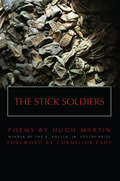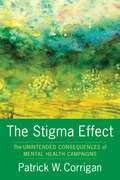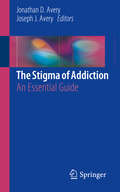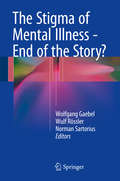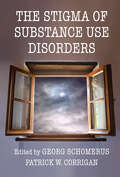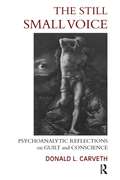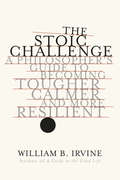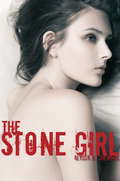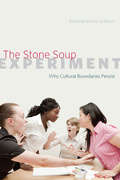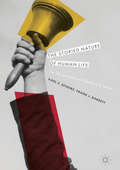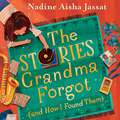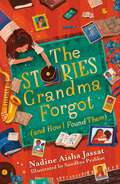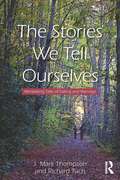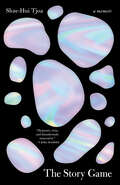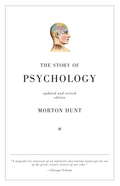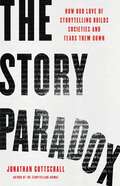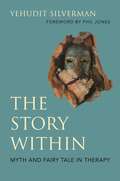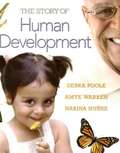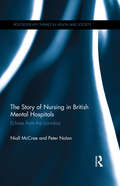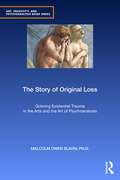- Table View
- List View
The Stick Soldiers (New Poets of America #35)
by Hugh MartinAt age nineteen, Hugh Martin withdrew from college for deployment to Iraq. After training at Fort Bragg, Martin spent 2004 in Iraq as the driver of his platoon sergeant's Humvee. He participated in hundreds of missions including raids, conducting foot patrols, clearing routes for IEDs, disposing of unexploded ordnance, and searching thousands of Iraqi vehicles. These poems recount his time in basic training, his preparation for Iraq, his experience withdrawing from school, and ultimately, the final journey to Iraq and back home to Ohio.Hugh Martin holds an MFA from Arizona State University. He is a Stegner Fellow at Stanford University.
The Stigma Effect: Unintended Consequences of Mental Health Campaigns
by Patrick CorriganDespite efforts to redress the prejudice and discrimination faced by people with mental illness, a pervasive stigma remains. Many well-meant programs have attempted to counter stigma with affirming attitudes of recovery and self-determination. Yet the results of these efforts have been mixed. In The Stigma Effect, psychologist Patrick W. Corrigan examines the unintended consequences of mental health campaigns and proposes new policies in their place.Corrigan analyzes the agendas of government agencies, mental health care providers, and social service agencies that work with people with mental illness, dissecting how their best intentions can misfire. For example, a campaign to change the language around mental illness by replacing supposedly stigmatizing words with empowering ones has made little difference in how people with mental health conditions are viewed. Educational programs that frame mental illness as a brain disorder have made the general public less likely to blame people for their illnesses, but also skeptical that such conditions can be cured. Ultimately, Corrigan argues that effective strategies require leadership by those with lived experience, as their recovery stories replace ideas of incompetence and dangerousness with ones of hope and empowerment. As an experienced clinical researcher, as an advocate, and as a person who has struggled with such prejudices, Corrigan challenges readers to carefully examine anti-stigma programs and reckon with their true effects.
The Stigma of Addiction: An Essential Guide
by Jonathan D. Avery Joseph J. AveryThis book explores the stigma of addiction and discusses ways to improve negative attitudes for better health outcomes. Written by experts in the field of addiction, the text takes a reader-friendly approach to the essentials of addiction stigma across settings and demographics. The authors reveal the challenges patients face in the spaces that should be the safest, including the home, the workplace, the justice system, and even the clinical community. The text aims to deliver tools to professionals who work with individuals with substance use disorders and lay persons seeking to combat stigma and promote recovery. The Stigma of Addiction is an excellent resource for psychiatrists, addiction medicine specialists, students across specialties, researchers, public health officials, and individuals with substance use disorders and their families.
The Stigma of Mental Illness - End of the Story?
by Norman Sartorius Wolfgang Gaebel Wulf RösslerThis book makes a highly innovativecontribution to overcoming the stigma and discrimination associated with mentalillness - still the heaviest burden both for those afflicted and those caringfor them. The scene is set by the presentation of different fundamentalperspectives on the problem of stigma and discrimination by researchers,consumers, families, and human rights experts. Current knowledge and practiceused in reducing stigma are then described, with information on the programmesadopted across the world and their utility, feasibility, and effectiveness. Thecore of the volume comprises descriptions of new approaches and innovativeprogrammes specifically designed to overcome stigma and discrimination. In theclosing part of the book, the editors - all respected experts in the field -summarize some of the most important evidence- and experience-basedrecommendations for future action to successfully rewrite the long andburdensome 'story' of mental illness stigma and discrimination.
The Stigma of Substance Use Disorders
by Patrick W. Corrigan Georg SchomerusStigma and discrimination of people with substance use disorders (SUD) contribute massively to the harm done by their condition: stigma has negative effects on service engagement, life opportunities, and personal shame, both for those who struggle with substance abuse and their families. Overcoming the stigma of substance use disorders is essential to aid recovery in those with SUD. This book provides an in-depth understanding of the stigma of SUD, and proposes ways to overcome it in different settings from the criminal justice system to healthcare. Combining a multitude of viewpoints within a consistent theoretical framework, this book both summarizes the latest evidence and gives hands-on advice and future directions on how to combat the stigma of SUD. People with lived experience of SUD, advocates, family members, policy makers, providers and researchers in the field of addiction stigma will greatly benefit from reading this book.
The Still Small Voice: Psychoanalytic Reflections on Guilt and Conscience
by Donald L. CarvethWhereas Freud himself viewed conscience as one of the functions of the superego, in The Still Small Voice: Psychoanalytic Reflections on Guilt and Conscience, the author argues that superego and conscience are distinct mental functions and that, therefore, a fourth mental structure, the conscience, needs to be added to the psychoanalytic structural theory of the mind. He claims that while both conscience and superego originate in the so-called pre-oedipal phase of infant and child development they are comprised of contrasting and often conflicting identifications. The primary object, still most often the mother, is inevitably experienced as, on the one hand, nurturing and soothing and, on the other, as frustrating and persecuting. Conscience is formed in identification with the nurturer; the superego in identification with the aggressor. There is a principle of reciprocity at work in the human psyche: for love received one seeks to return love; for hate, hate (the talion law).
The Stoic Challenge: A Philosopher's Guide To Becoming Tougher, Calmer, And More Resilient
by William B. IrvineA practical, refreshingly optimistic guide that uses centuries-old wisdom to help us better cope with the stresses of modern living. Some people bounce back in response to setbacks; others break. We often think that these responses are hardwired, but fortunately this is not the case. Stoicism offers us an alternative approach. Plumbing the wisdom of one of the most popular and successful schools of thought from ancient Rome, philosopher William B. Irvine teaches us to turn any challenge on its head. The Stoic Challenge, then, is the ultimate guide to improving your quality of life through tactics developed by ancient Stoics, from Marcus Aurelius and Seneca to Epictetus. This book uniquely combines ancient Stoic insights with techniques discovered by contemporary psychological research, such as anchoring and framing. The result is a surprisingly simple strategy for dealing with life’s unpleasant and unexpected challenges—from minor setbacks like being caught in a traffic jam or having a flight cancelled to major setbacks like those experienced by physicist Stephen Hawking, who slowly lost the ability to move, and writer Jean-Dominique Bauby, who suffered from locked-in syndrome. The Stoics discovered that thinking of challenges as tests of character can dramatically alter our emotional response to them. Irvine’s updated “Stoic test strategy” teaches us how to transform life’s stumbling blocks into opportunities for becoming calmer, tougher, and more resilient. Not only can we overcome everyday obstacles—we can benefit from them, too.
The Stolen Child: The most heartwrenching and heartwarming saga you'll read this year
by Jennie Felton'One of the nation's favourite saga writers' Lancashire Post'A real heartbreaker' Peterborough Telegraph'Brimming with high drama, anguish, love, loss, tragedy, and gripping twists and turns, this is an absorbing and poignant story... Felton, a born storyteller, has a warm and compassionate heart...and an eye for the rich period detail that brings the past to life' Lancashire PostA powerful new saga from Jennie Felton in the grand tradition of Josephine Cox, Dilly Court, Maggie Hope and Rosie Goodwin of love, loss, tragedy, drama, secrets and twists and turns.Readers are hooked by The Stolen Child!'Like the twists and turns...a great read' 5* reader review'Keeps you on the edge...could not put it down' 5* reader review'A heartbreaking read. 5 stars' 5* reader review'A must read' 5* reader reviewWill anyone believe her baby is gone?When Stella Swift is discovered holding a shard of broken glass near her newborn baby boy, fears that she might harm William result in her being taken to Catcombe - the local asylum. Although the regime is not as harsh as it once was, it's not somewhere that Tom wants to send his wife - but he has no choice.Turning to his kind-hearted sister-in-law Grace for help taking care of his other three children whilst he keeps working at the mine seems like the simplest solution until Stella is well - if only there wasn't the shared history between Tom and Grace...At first Catcombe seems to offer the respite Stella needs - until one day she becomes convinced that the baby the nurses have given to her is not William. Is Stella losing her mind? Or is it true that a mother will always know her own child?Don't miss Jennie's Families of Fairley Terrace series, which began with Maggie's story in All The Dark Secrets and continued with Lucy's story in The Miner's Daughter, Edie's story in The Girl Below Stairs, Carina's story in The Widow's Promise and Laurel's story in The Sister's Secret.
The Stolen Child: The most heartwrenching and heartwarming saga you'll read this year
by Jennie Felton'One of the nation's favourite saga writers' Lancashire Post'A real heartbreaker' PeterboroughTelegraph'Brimming with high drama, anguish, love, loss, tragedy, and gripping twists and turns, this is an absorbing and poignant story... Felton, a born storyteller, has a warm and compassionate heart...and an eye for the rich period detail that brings the past to life' Lancashire PostA powerful new saga from Jennie Felton in the grand tradition of Josephine Cox, Dilly Court, Maggie Hope and Rosie Goodwin of love, loss, tragedy, drama, secrets and twists and turns.Readers are hooked by The Stolen Child!'Like the twists and turns...a great read' 5* reader review'Keeps you on the edge...could not put it down' 5* reader review'A heartbreaking read. 5 stars' 5* reader review'A must read' 5* reader reviewWill anyone believe her baby is gone?When Stella Swift is discovered holding a shard of broken glass near her newborn baby boy, fears that she might harm William result in her being taken to Catcombe - the local asylum. Although the regime is not as harsh as it once was, it's not somewhere that Tom wants to send his wife - but he has no choice.Turning to his kind-hearted sister-in-law Grace for help taking care of his other three children whilst he keeps working at the mine seems like the simplest solution until Stella is well - if only there wasn't the shared history between Tom and Grace...At first Catcombe seems to offer the respite Stella needs - until one day she becomes convinced that the baby the nurses have given to her is not William. Is Stella losing her mind? Or is it true that a mother will always know her own child?Don't miss Jennie's Families of Fairley Terrace series, which began with Maggie's story in All The Dark Secrets and continued with Lucy's story in The Miner's Daughter, Edie's story in The Girl Below Stairs, Carina's story in The Widow's Promise and Laurel's story in The Sister's Secret.
The Stolen Child: The most heartwrenching and heartwarming saga you'll read this year
by Jennie Felton'One of the nation's favourite saga writers' Lancashire PostA powerful new saga from Jennie Felton in the grand tradition of Josephine Cox, Dilly Court, Maggie Hope and Rosie Goodwin of love, loss, tragedy, drama, secrets and twists and turns.Who will believe this baby is not hers?When Stella Swift is discovered holding a shard of broken glass near her newborn baby boy, fears that she might harm William result in her being taken to Catcombe - the local asylum. Although the regime is not as harsh as it once was, it's not somewhere that Tom wants to send his wife - but he has no choice.Turning to his kind-hearted sister-in-law Grace for help taking care of his other three children whilst he keeps working at the mine seems like the simplest solution until Stella is well - if only there wasn't the shared history between Tom and Grace...At first Catcombe seems to offer the respite Stella needs - until one day she becomes convinced that the baby the nurses have given to her is not William. Is Stella losing her mind? Or is it true that a mother will always know her own child?Don't miss Jennie's Families of Fairley Terrace series, which began with Maggie's story in All The Dark Secrets and continued with Lucy's story in The Miner's Daughter, Edie's story in The Girl Below Stairs, Carina's story in The Widow's Promise and Laurel's story in The Sister's Secret.(p) 2019 Headline Publishing Group Ltd
The Stone Girl
by Alyssa B. SheinmelShe feels like a creature out of a fairy tale; a girl who discovers that her bones are really made out of stone, that her skin is really as thin as glass, that her hair is brittle as straw, that her tears have dried up so that she cries only salt. Maybe that's why it doesn't hurt when she presses hard enough to begin bleeding: it doesn't hurt, because she's not real anymore.High school senior Sarah Beth (Sethie) Weiss is disciplined. She has never cut a class in her life, has never had a grade below a B+, and has always been a favorite among her teachers. Her college applications are finished and she only ate six Ritz crackers today. But even on days when Sethie needs to eat more, there's always the toilet to make up for her mistakes. Sethie manages to get down to 104, and maybe if she works just a little bit harder, becomes a little more disciplined, she can get below 100. Truth be told, Sethie has more to worry about than her relationship with her body; but the deeper she descends into her disorder, the smaller her world gets and the harder it is to see her way out.
The Stone Soup Experiment: Why Cultural Boundaries Persist
by Deborah DowningThe Stone Soup Experiment is a remarkable story of cultural difference, of in-groups, out-groups, and how quickly and strongly the lines between them are drawn. It is also a story about simulation and reality, and how quickly the lines between them can be dismantled. In a compulsively readable account, Deborah Downing Wilson details a ten-week project in which forty university students were split into two different simulated cultures: the carefree Stoners, and the market-driven Traders. Through their eyes we are granted intimate access to the very foundations of human society: how group identities are formed and what happens when opposing ones come into contact. The experience of the Stoners and Traders is a profound testament to human sociality. Even in the form of simulation, even as a game, the participants found themselves quickly—and with real conviction—bound to the ideologies and practices of their in-group. The Stoners enjoyed their days lounging, chatting, and making crafts, while the Traders—through a complex market of playing cards—competed for the highest bankrolls. When they came into contact, misunderstanding, competition, and even manipulation prevailed, to the point that each group became so convinced of its own superiority that even after the simulation’s end the students could not reconcile. Throughout her riveting narrative, Downing Wilson interweaves fascinating discussions on the importance of play, emotions, and intergroup interaction in the formation and maintenance of group identities, as well as on the dynamic social processes at work when different cultural groups interact. A fascinating account of social experimentation, the book paints a vivid portrait of our deepest social tendencies and the powers they have over how we make friends and enemies alike.
The Stone Soup Experiment: Why Cultural Boundaries Persist
by Deborah Downing WilsonThe Stone Soup Experiment is a remarkable story of cultural difference, of in-groups, out-groups, and how quickly and strongly the lines between them are drawn. It is also a story about simulation and reality, and how quickly the lines between them can be dismantled. In a compulsively readable account, Deborah Downing Wilson details a ten-week project in which forty university students were split into two different simulated cultures: the carefree Stoners, and the market-driven Traders. Through their eyes we are granted intimate access to the very foundations of human society: how group identities are formed and what happens when opposing ones come into contact. The experience of the Stoners and Traders is a profound testament to human sociality. Even in the form of simulation, even as a game, the participants found themselves quickly--and with real conviction--bound to the ideologies and practices of their in-group. The Stoners enjoyed their days lounging, chatting, and making crafts, while the Traders--through a complex market of playing cards--competed for the highest bankrolls. When they came into contact, misunderstanding, competition, and even manipulation prevailed, to the point that each group became so convinced of its own superiority that even after the simulation's end the students could not reconcile. Throughout her riveting narrative, Downing Wilson interweaves fascinating discussions on the importance of play, emotions, and intergroup interaction in the formation and maintenance of group identities, as well as on the dynamic social processes at work when different cultural groups interact. A fascinating account of social experimentation, the book paints a vivid portrait of our deepest social tendencies and the powers they have over how we make friends and enemies alike.
The Storied Nature of Human Life
by Frank J. Barrett Karl E. ScheibeThis book explores Theodore Sarbin's life and work, and includes 10 of Sarbin's publications from the last two decades of his life. Theodore R. Sarbin had a career in psychology that spanned 70 years, establishing a place for social role theory in contemporary psychology and making major contributions to understandings of hypnosis, psychopathology, criminal behaviour, and imagination. This book amplifies the voice and influence of one of the most significant critical thinkers in psychology of the last century. The book serves as a commentary on changes now taking place in contemporary psychology; it is historically informed and yet focused on the future of psychological theory and practice. The book will be of great interest to psychologists, philosophers and social scientists.
The Stories Grandma Forgot (and How I Found Them)
by Nadine Aisha JassatFrom an award-winning poet comes a gripping mystery. "Grandma Farida has Alzheimer's - but I'm going to help her remember a huge secret..."Twelve-year-old Nyla's dad died when she was four, or that's what she's been told. So when Grandma Farida insists she saw him in the local supermarket, Nyla wonders if Grandma is simply "time travelling" again - the phrase she uses when Grandma forgets.But Grandma is Nyla's best friend and when she asks Nyla to find her dad and bring him home, Nyla decides to make a brand new promise to her Grandma: to find him.As Nyla turns detective and sets out on a journey through her family's past to try and find the truth, she also hopes that uncovering important stories will help her understand who she is, and where she fits in the world ...A riveting audiobook in verse about the power of memory and story-telling, and an unbreakable bond between a grandmother and granddaughter. (P) 2023 Hodder & Stoughton Limited
The Stories Grandma Forgot (and How I Found Them)
by Nadine Aisha Jassat'One of those books that truly makes the world a better place.' Sophie Anderson, author of the House with Chicken LegsFrom acclaimed poet Nadine Aisha Jassat comes a gripping mystery... "Grandma Farida is losing her memory - but I'm going to help her remember a huge secret."Twelve-year-old Nyla's dad died when she was four, or that's what she's been told. So when Grandma Farida insists she saw him in the supermarket, Nyla wonders if she is 'time-travelling' again - the phrase she uses when Grandma forgets. But when Grandma asks Nyla to find her dad and bring him home, Nyla promises that she will. As Nyla sets out on her journey, she hopes that uncovering the past will help her to understand the mystery at the heart of her family ... and to work out who she is. A page-turning verse novel about memory and identity, and a bond that soars above all else.'A beautiful read about love, family, identity and worth.' Hannah Gold, author of The Last Bear'A tender story about the meaning of life and love and loss.' Katya Balen, author of October, October
The Stories We Are
by William RandallFrom time to time we all tend to wonder what sort of "story" our life might comprise: what it means, where it is going, and whether it hangs together as a whole. In The Stories We Are, William Lowell Randall explores the links between literature and life and speculates on the range of storytelling styles through which people compose their lives. In doing so, he draws on a variety of fields, including psychology, psychotherapy, theology, philosophy, feminist theory, and literary theory.Using categories like plot, character, point of view, and style, Randall plays with the possibility that we each make sense of the events of our lives to the extent that we weave them into our own unfolding novel, as simultaneously its author, narrator, main character, and reader. In the process, he offers us a unique perspective on features of our day-to-day world such as secrecy, self-deception, gossip, prejudice, intimacy, maturity, and the proverbial "art of living."First published in 1995, this second edition of The Stories We Are includes a new preface and afterword by the author that offer insight into his argument and evolution as a scholar, as well as an illuminating foreword by Ruthellen Josselson.
The Stories We Tell Ourselves: Mentalizing Tales of Dating and Marriage
by Richard Tuch J. Mark ThompsonThe Stories We Tell Ourselves: Mentalizing Tales of Dating and Marriage is about the dynamics of intimate interpersonal relationships (dating and marriage) - how and why human pairings occur, what helps them function optimally and how therapists can intervene when they don't. J. Mark Thompson and Richard Tuch employ a multidimensional perspective that provides a variety of "lenses" through which intimate relationships can be viewed. The authors also offer a new model of couples therapy based on the mentalization model of treatment developed by Peter Fonagy and his colleagues. This book is aimed at those interested in the nature of intimate relationships as well as those wishing to expand their clinical skills, whether they are conducting one-on-one therapy with individuals struggling to establish and maintain intimate relations or are conducting conjoint treatment with troubled couples who have sought the therapist's assistance. Thompson and Tuch view relationships from a wide array of different perspectives: mentalization, attachment theory, evolutionary psychology, psychoanalysis, pattern recognition (neuroscience), and role theory. A mentalization based approach to couples therapy is clearly explained in a "how to" fashion, with concrete suggestions about how the therapist goes about clinically intervening given their expanded understanding of the dynamics of intimate relations outlined in the book. The Stories We Tell Ourselves: Mentalizing Tales of Dating and Marriage will appeal to psychoanalysts, psychotherapists, psychiatrists, psychologists, clinical social workers, marriage therapists, and all those interested in both learning more about the dynamics of one-on-one intimate relationships (dating and marriage) from a truly multidimensional perspective and in learning how to conduct mentalization-based couples therapy.
The Story Game
by Shze-Hui TjoaAs Seen in The New York Times Book Review “Hypnotic, wise, and thunderously innovative.”— T Kira Madden “A powerful work of art and healing.”—Jaquira Díaz In the humid dark of a eucalyptus-scented room, a woman named Hui lies on a mattress telling stories about herself to her listener, a little girl. She talks about her identity as the child of an immigrant, her feelings about being in a mixed-race marriage, her opinions on mental health. But as her stories progress, it becomes clear a volatile secret lurks beneath their surface. There are events in Hui’s past that have great significance for the person she’s become, but that have gone missing from her memory. What is it, exactly, that is haunting Hui? Who is the little girl she talks to? And who is Hui herself? As the conversation continues, what unfolds is a breathtaking, unexpected journey through layers of story toward truth and recovered identity; a memoir that reenacts, in tautly novelistic fashion, the process of healing that author Shze-Hui Tjoa moved through to recover memories lost to complex PTSD and, eventually, reconstruct her sense of self. Stunning in its originality and intimacy, The Story Game is a piercing tribute to selfhood and sisterhood, a genre-shattering testament to the power of imagination, and a one-of-a-kind work of art.
The Story Of Psychology
by Morton HuntSocrates, Plato, Descartes, Spinoza, Mesmer, William James, Pavlov, Freud, Piaget, Erikson, and Skinner. Each of these thinkers recognized that human beings could examine, comprehend, and eventually guide or influence their own thought processes, emotions, and resulting behavior. The lives and accomplishments of these pillars of psychology, expertly assembled by Morton Hunt, are set against the times in which the subjects lived. Hunt skillfully presents dramatic and lucid accounts of the techniques and validity of centuries of psychological research, and of the methods and effectiveness of major forms of psychotherapy. Fully revised, and incorporating the dramatic developments of the last fifteen years, The Story of Psychology is a graceful and absorbing chronicle of one of the great human inquiries--the search for the true causes of our behavior.
The Story Paradox: How Our Love of Storytelling Builds Societies and Tears them Down
by Jonathan GottschallStorytelling, a tradition that built human civilization, may soon destroy itHumans are storytelling animals. Stories are what make our societies possible. Countless books celebrate their virtues. But Jonathan Gottschall, an expert on the science of stories, argues that there is a dark side to storytelling we can no longer ignore. Storytelling, the very tradition that built human civilization, may be the thing that destroys it.In The Story Paradox, Gottschall explores how a broad consortium of psychologists, communications specialists, neuroscientists, and literary quants are using the scientific method to study how stories affect our brains. The results challenge the idea that storytelling is an obvious force for good in human life. Yes, storytelling can bind groups together, but it is also the main force dragging people apart. And it&’s the best method we&’ve ever devised for manipulating each other by circumventing rational thought. Behind all civilization&’s greatest ills—environmental destruction, runaway demagogues, warfare—you will always find the same master factor: a mind-disordering story.Gottschall argues that societies succeed or fail depending on how they manage these tensions. And it has only become harder, as new technologies that amplify the effects of disinformation campaigns, conspiracy theories, and fake news make separating fact from fiction nearly impossible.With clarity and conviction, Gottschall reveals why our biggest asset has become our greatest threat, and what, if anything, can be done. It is a call to stop asking, &“How we can change the world through stories?&” and start asking, &“How can we save the world from stories?&”
The Story Within - Myth and Fairy Tale in Therapy
by Yehudit SilvermanSomewhere hidden in the depths of each story lies a treasure waiting to be discovered...This creative arts therapies approach uses myth and fairy tale to explore personal challenges. Clients begin by choosing a myth or fairy tale character they feel drawn to, but don't know why. They and their chosen character then embark on a guided creative journey that leads them to discover hidden, unconscious, aspects of themselves. The process is holistic, using all the arts. In addition to explaining the theoretical background of this approach, the book provides detailed step-by-step instructions for readers to follow for their own personal exploration, including specific creative exercises at each stage, and guidelines for using the approach with clients. Also included are clinical case vignettes, reflections from people who have experienced the process, and the authors own personal journey.Whether you are a creative arts therapist seeking to expand your practice, or a health professional searching for a new, creative way of working with clients, The Story Within is an exciting new resource.
The Story of Human Development (1st edition)
by Debra A. Poole Narina Nunez Amye WarrenThe book presents fascinating details and descriptions of human development throughout the lifespan with a narrative infused with the rich and diverse stories of people's lives, the compelling organization, a unique connecting summaries and focus on guiding developmental principles. This text puts the science of human development into a framework that better explains and explores how a whole person develops within varying environmental contexts.
The Story of Nursing in British Mental Hospitals: Echoes from the Corridors (Routledge Key Themes in Health and Society)
by Peter Nolan Niall McCraeFrom their beginnings as the asylum attendants of the 19th century, mental health nurses have come a long way. This comprehensive volume is the first book in over twenty years to explore the history of mental health nursing, and during this period the landscape has transformed as the large institutions have been replaced by services in the community. McCrae and Nolan examine how the role of mental health nursing has evolved in a social and professional context, brought to life by an abundance of anecdotal accounts. Moving from the early nineteenth to the end of the twentieth century, the book’s nine chronologically-ordered chapters follow the development from untrained attendants in the pauper lunatic asylums to the professionally-qualified nurses of the twentieth century, and, finally, consider the rundown and closure of the mental hospitals from nurses’ perspectives. Throughout, the argument is made that whilst the training, organisation and environment of mental health nursing has changed, the aim has remained essentially the same: to develop a therapeutic relationship with people in distress. McCrae and Nolan look forward as well as back, and highlight significant messages for the future of mental health care. For mental health nursing to be meaningfully directed, we must first understand the place from which this field has developed. This scholarly but accessible book is aimed at anyone with an interest in mental health or social history, and will also act as a useful resource for policy-makers, managers and mental health workers.
The Story of Original Loss: Grieving Existential Trauma in the Arts and the Art of Psychoanalysis (Art, Creativity, and Psychoanalysis Book Series)
by Malcolm Owen Slavin, PhDThis book explores the universal human existential trauma of "original loss," a trauma the author describes as arising from our primal, human evolutionary loss of experiencing ourselves as innately belonging to, and instinctively at home within, the larger natural world.In this trauma arose our existential awareness of impermanence and mortality along with the need to mourn that loss in order to create a sense of belonging and identity. The book describes how the invention of art and group ritual became the collective ways we mourn our shared existential loss. It describes as well how it is the art within the psychoanalytic practice that enables both patient and analyst to grieve their individual versions of our shared original loss. Drawing on the work of Winnicott, Loewald and Ogden, as well as art theory and religion, this book offers a new perspective on the intersection of metaphorical artistic thinking and psychoanalysis.This book will appeal to psychoanalysts, psychotherapists, and scholars of poetic, visual and muscial metaphor, creativity, evolution and history of art.
